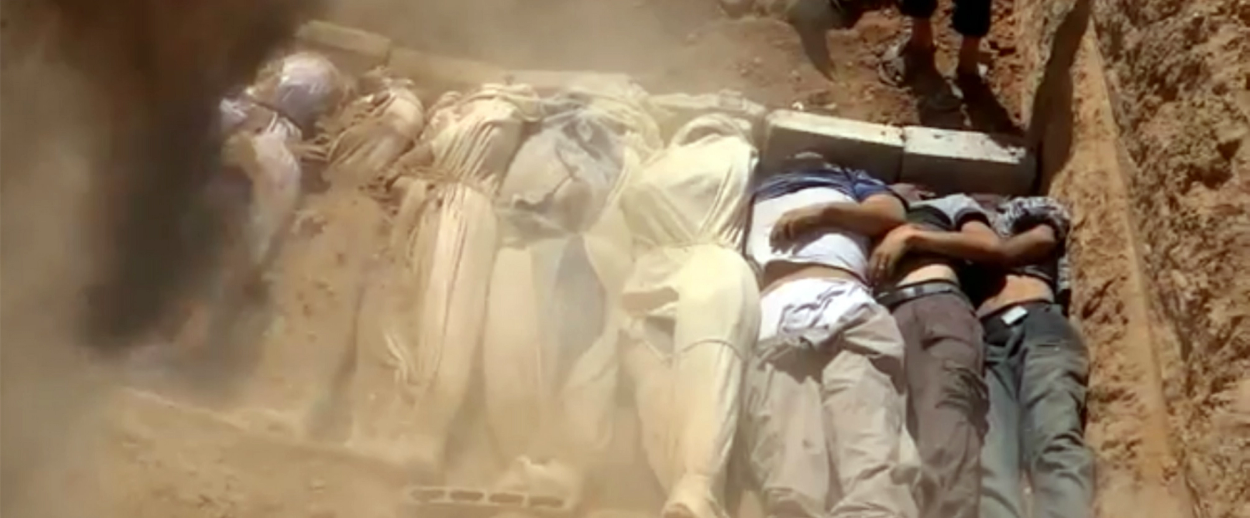Victory Through Massacre in Syria
The Ghouta attack was a military success—it established that Assad could use weapons of mass destruction with complete impunity




Today marks five years since the regime of Syrian President Bashar al-Assad dropped sarin gas on a contested neighborhood in the Damascus suburbs, killing over 1,400 people in a space of a few minutes. A half-decade later Assad is still president of Syria. His brother Maher al-Assad is still the commander of the Syrian Arab Army’s Fourth Armored Division, which includes the Scud and sarin-equipped 155th Missile Brigade. The directors of the institutes responsible for designing and developing the regime’s chemical arsenals still have their jobs, as does everyone in Syria’s “chemical chain of command” who has managed to survive this long.
The Ghouta attack was a military success—it established that Assad could use weapons of mass destruction with complete impunity, giving him both a tactical and psychological advantage that facilitated his government’s bloody reconquest of most opposition-held territory in the five years since. Assad’s campaign to obscure the truth of what happened in Ghouta was also a success. Sy Hersh, whose trutherism about regime culpability for the attack made it into the august pages of the London Review of Books, has returned to respectability on the strength of a recent memoir and book tour. “Perpetrators: Disputed,” reads the Wikipedia article about the atrocity. Major political figures, including British Labour Party leader Jeremy Corbyn, continue to discuss the use of aerially delivered chemical weapons in a war where only one side has an air force, as if regime responsibility were not a settled matter. In the days after the Ghouta attack, Russian President Vladimir Putin said it was “utter nonsense” to suggest Assad was guilty. Today, the Russian president who has dispatched elements of his own military to shore up the Assad regime, is perhaps the most powerful outside player in the Middle East.
The story of Ghouta, and of the Syrian Civil War in general, is one of people paying no discernible price—and in many cases handsomely benefiting—after committing the worst acts human beings can commit. One possible moral of the Syria conflict is that if something horrible happens long enough and often enough, people will just decide to forget it ever happened or ignore it if it continues to happen. For instance, earlier this month, the Assad regime acknowledged that several thousand political prisoners have died in its jails since the war started in 2011. This news gave additional shape to conscience-lashing reports about mass tortures and executions within the Assadist gulag published in 2014, 2015, 2016, and 2017. For four years, the wholesale murder of political dissidents inside Assad’s prisons has been one of the more meticulously documented human rights abuses of the 21st century, and has, nevertheless, continued unabated.
Five years ago the world could be bothered to care about events in Syria for as many as several days at a time, so Ghouta, unlike the prison murders, at least incited a genuine international crisis. Granted, that crisis was resolved through a U.S.-brokered deal in which Russia said it would help remove all chemical weapons from Syria, an agreement which we now know to have been a transparent deceit on the part of both Moscow and Damascus. It’s hardly surprising that neither regime paid for its lies. The United States and its allies wanted the illusion of a solution to the chemical weapons problem, which is exactly what the agreement bought them. The illusion of a solution is also what the Trump administration bought through its pinprick strikes on Assad regime targets as a penalty for chemical attacks in April of 2017 and April of this year. But as Ghouta began to reveal, a mirage is perhaps the best that Syrians can hope for.
Armin Rosen is a staff writer for Tablet Magazine.